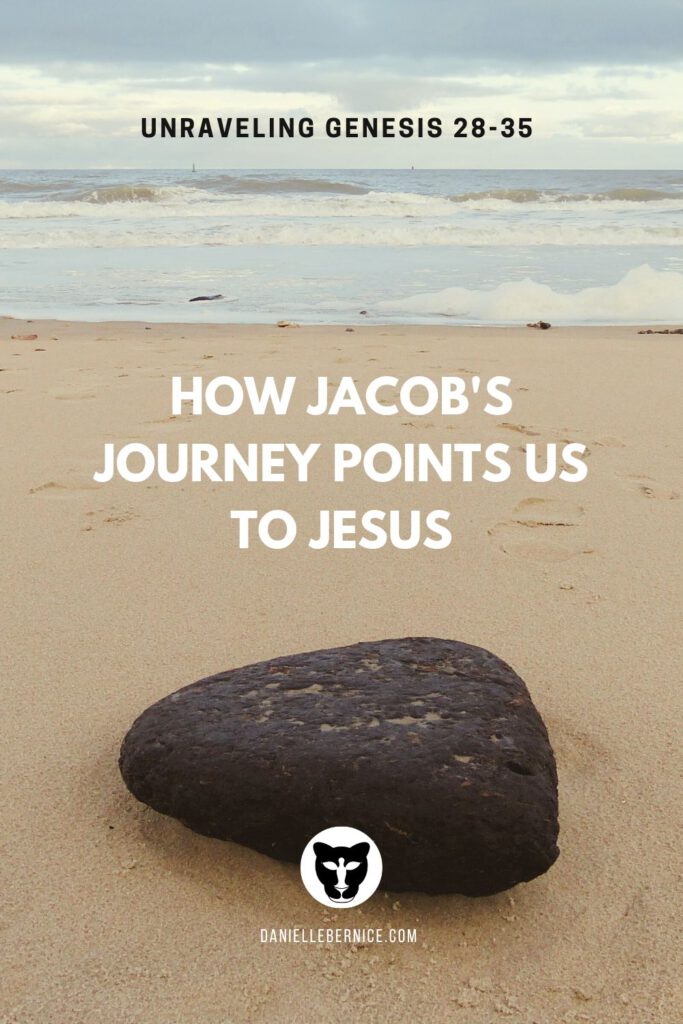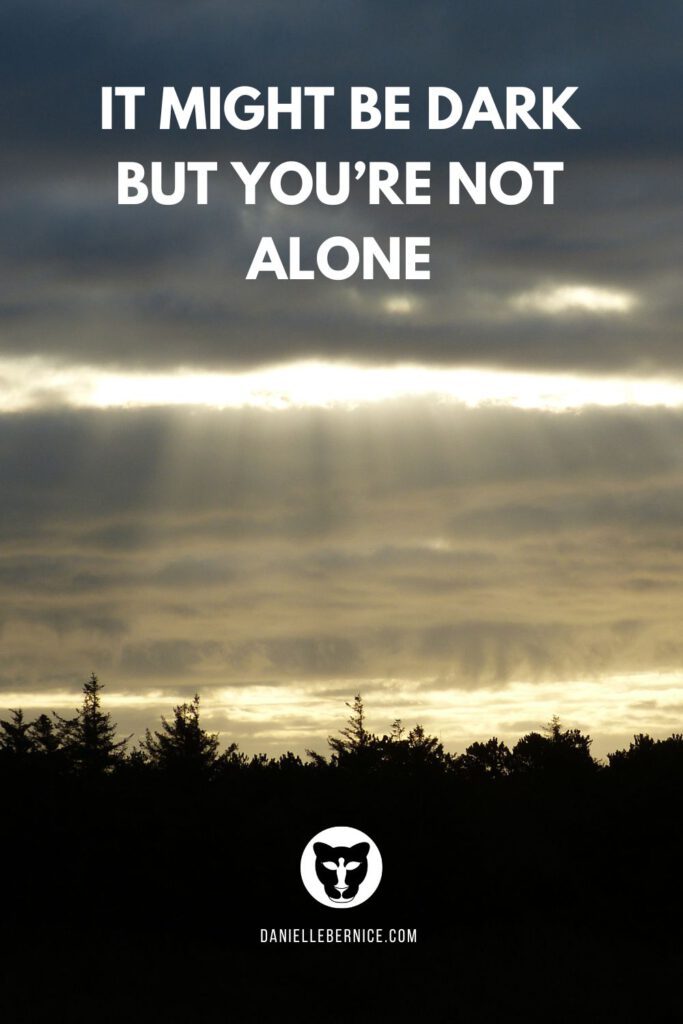Have you ever felt lonely, troubled, tired, or unsure if you can make it through another day?
Even Christians, who ought to walk in the Light and presence of Christ, face doubt, darkness, troubles, and loneliness sometimes. There is a good reason for that, as you will find out in this article.
In this first part of the series that seeks Jesus in Jacob’s journey, we will look at the significance of our dark and lonely days. Let’s dig in!
The journey begins…
In obedience to his parents, Jacob went on a long journey (hundreds of miles) from Beersheba to his family in Haran.
I always used to envision Jacob as a young man, falling in love with a young woman. But did you realize that Jacob was at least 70 years of age when he left home? We can estimate his age by deducting the timeframes we know from Genesis 29:30, 30:24, 41:46, 45:6, and 47:9.
Knowing that Jacob wasn’t a spring chicken anymore changed the atmosphere of the story for me. But it also made me realize that he had been living with his parents for all those years! One can imagine that leaving his parental home for the first time in more than 70 years was a tremendously big and probably scary step.
Leaving everything behind…
Jacob left all he had behind. His home, his closest family members, the area where he had lived for decades, probably his friends, and all of his personal belongings.
It is unclear what or who Jacob brought with him on his journey. He said that he only carried a staff (Genesis 32:10) but that could have been a matter of speech, as we know that when he arrived at the stopover in Bethel, he also had some oil (Genesis 28:18).
The distance between Beersheba and Bethel was about 3 days on foot. The phrase “So he came to a certain place and stayed there all night because the sun had set” (Genesis 28:11a) doesn’t necessarily mean that it was the first sunset on his journey, although it seems to suggest it.
If he traveled the distance in one day, it is possible that he had some kind of transport. If he had traveled on foot and did not carry anything other than a staff and oil at that point, he must have been extremely tired, hungry, and thirsty by the time he arrived at Bethel.
He may have been completely alone, but there is also a slight possibility that he brought his mother’s nurse with him. The reason I say this is because Rebekah’s nurse (Deborah) lived with them in their parental home (Genesis 24:59-61). And unless Deborah traveled back to Laban’s house some other time (for example after Rebekah’s death), she must have accompanied Jacob because she died in Bethel on their trip back (Genesis 35:6-8). I wouldn’t put it past Rebekah to send her nurse with Jacob to help him navigate the land Deborah knew so well, since Rebekah seemed to care more about her son than her own wellbeing (Genesis 25:28, 27:13).
But we don’t know. The worst-case scenario is that Jacob wandered all alone, with nothing but a staff and some oil he acquired along the way. Either way, we know that Jacob had a long, long road ahead, without ample provisions, and no guarantee he was going to make it.
And then it became dark…
When Jacob arrived at Bethel (at that moment called Luz), he stayed there because the sun had set. Although the text doesn’t say, I think that the setting of the sun most likely also described Jacob’s mood at that time: I imagine that he felt demoralized at that point. He must have felt lonely and sad going on this long and probably dangerous journey to unknown territory, leaving everything behind that was dear to him.
You see, there was good reason for him to not be basking in joy: Jacob was fleeing from his brother who was so upset with him that he wanted to kill him in revenge, so it wouldn’t be a stretch to think that he was scared (Genesis 27:41-42). He might have felt anxious for another reason too: his personality was the opposite of his brother’s who liked to be outside to hunt; Jacob was more introverted and loved the indoors (Genesis 25:27). And now he was forced to be outdoors, in unfamiliar territory, in the dark.
He probably didn’t feel sure that he would make it to Paddan-Aram without ample food and proper protection. Even if he would reach his destination alive, it was unclear what he would find in that place and if he would ever be able to return. So, when the sun had set, he took a stone and put it under his head (Genesis 28:11).
[The text continues after the image.]
He had troubles enough to keep most people up, but using a stone for a pillow was probably not going to make it any easier to fall asleep. The mere thought of that makes my own head hurt. But somehow, with all those odds against him, he still managed to sleep.
I believe this act of sleeping with his head on a stone, has spiritual significance. Jacob didn’t know it when he fell asleep, but his head symbolically rested on the Rock of Israel, the Shepherd, in what Jacob later referred to as God’s house (Genesis 28:22, 49:24, 1 Samuel 2:2). And resting on the Rock, is the best way to get unshakable sleep (Proverbs 3:24, Matthew 7:25).
When worries keep us up at night, we should follow this example and rest our heads, figuratively, on the Rock: “In peace I will lie down and sleep, for you alone, Lord, make me dwell in safety.” (Psalm 4:8, NIV)
It really is as simple as that: when we put our trust in Him, there is no reason for worry; He will bless us, guard us, and provide for us!
It might be dark, but you are not alone
The moment we begin to follow God, we also set out on a journey full of uncertainties, leaving a life behind that was familiar to us. We might feel excited at first, but when we enter a season of darkness, we often feel anxious, alone, and sad. We can feel troubled by the thought that there are people out there who hate us or feel uncertain if we will make it through the day when we lack things like food, company, money, or energy. If you are in that season right now, know that you are not alone!
God showed Himself to Jacob in a dream saying He would be with him and protect him wherever he would go. God would bring him back to the promised land safely and would not leave his side until His promise was fulfilled (Genesis 28:15).
In that dream, God introduced Himself to Jacob as “Yahweh, the God of Abraham your father and the God of Isaac” (Genesis 28:13). That tells me that Jacob did not have his own relationship with God up to that point; he knew of God through his forefathers, but did not know Him personally.
But from that morning on, Jacob started to trust God for His provisions, protection, and care, even though he had no roof over his head to show for at that point.

You can do the same! You can trust God with your life since this promise is for you too, and God always keeps His promises. Even when you feel that you are in a dark and lonely place, rest assured that He will watch over you, protect you, and guide you to fulfill His promises for your life. Amen!
This blessing is for you too
In Jacob’s dream (Genesis 28:10-15), God answered Isaac’s prayer for Jacob: “God Almighty bless you and make you fruitful and multiply you, that you may become a company of peoples. May he give the blessing of Abraham to you and to your offspring with you, that you may take possession of the land of your sojournings that God gave to Abraham!” (Genesis 28:3-4, ESV).
But God did not just answer the prayer, He responded with an even bigger blessing! He wouldn’t just make Jacob fruitful, He promised Him an offspring as innumerable as the dust of the earth, spreading across the globe in all directions, blessing all the families of the earth. That is some answer to prayer!
In the third part of this series, we will see that God’s blessing isn’t only directed at Jacob’s (and Abraham’s) direct offspring. It is also a foreshadowing of what was to come: Jesus and His offspring (Galatians 3:16). We are Jesus’s offspring, and thanks to Him, we are grafted in, to share in the nourishing root of the olive tree (Romans 11:17). Through Him, we are the Spirit-filled dust of the earth, coworkers in spreading the Good News across the globe and being a blessing to others (Galatians 3:29). So, we are also heirs of the promise (Ephesians 3:6).
Leaving everything behind to gain much, much more
This kind of foreshadowing continues throughout the story. In the New Testament, we can read how Jesus often referred back to foreshadowings like these. A New Testament verse that reminds me of Jacob finding a stone to sleep on is this one: “And Jesus said to him, ‘Foxes have holes, and birds of the air have nests, but the Son of Man has nowhere to lay his head.’” (Matthew 8:20, ESV)
This verse reminds us that following Jesus means leaving everything behind, including the comfort, familiarity, and protection of a place you once called home. Instead of hanging on to these things, we become sojourners, strangers in a land we don’t call home, leaning on God for provisions and safety, just like Jacob did.
Jacob left everything behind to become fruitful. He returned not only fruitful with 13 children by his 4 wives, but also enriched with oxen, donkeys, flocks, herds, camels, and servants (Genesis 32:5-7). Despite his uncle’s attempts to steal his blessings, God blessed Jacob and provided for him as He promised.
When we go out into this strange, uncomfortable world to be fruitful and to multiply, we do this predominantly by sharing the Gospel and making disciples of all nations. The fruit and riches we take home to the promised land are spiritual.
Following Jesus isn’t easy in the way the world classifies ‘easy’. But if we let go of the world (what is seen) and focus on what is in heaven (what is unseen) we will be as light as a feather, and safe under the protection of God’s wings. Even though the enemy tries to steal our blessings, God will help us succeed and gain much more than we left behind:
“And everyone who has left houses or brothers or sisters or father or mother or children or lands, for my name’s sake, will receive a hundredfold and will inherit eternal life.” (Matthew 19:29, ESV)
That is why God allows us to:
- Experience darkness, so that we will seek His Light.
- Become tired, so that we will find His Rock to rest on.
- Feel frightened, so that we learn to crawl into His protective arms.
- Doubt everything, so that we will lean on Him for security.
- Feel lonely, so that we seek His companionship.
- Become hungry, so that we will yearn for the Bread of Life.
- Have very little, so that in Him we find all we need.
Throughout his journey, Jacob faced these challenges too. But it was through these challenges, that he grew from knowing about God to having a personal relationship with God. A relationship in which God walked with Jacob and answered him whenever he was distressed (Genesis 35:3).
Jacob started his journey as a 70-year-old boy, but he came home to his father as a God-fearing fruitful man. May we say the same when we come home to our Father after our own challenging journeys!
Read the next part of this 5-part series here: https://daniellebernice.com/articles/the-prophecies-hidden-in-the-love-triangle-between-jacob-rachel-and-leah/

